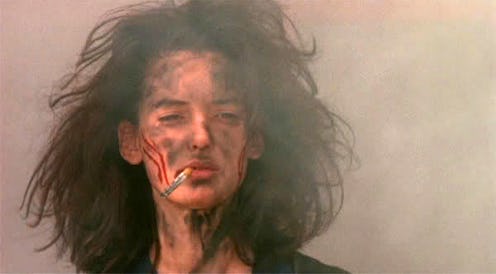Entertainment
Feminist Movie Moments You Didn't Notice

Many movie fans are quick to label movies as either explicitly feminist, or sadly reinforcing of traditional gender roles. The discussion around this year's summer blockbusters show how feminism in film is oftentimes made clear as can be. Mad Max: Fury Road is without a doubt, a super feminist film, as demonstrated by Charlize Theron's character, Imperator Furiosa, leading the mission and seizing control. The most feminist moment is the one in which Mad Max hands her the gun, offering to use his shoulder for her to mount her rifle on, because she is the better sniper. Sometimes, filmmakers are explicit with their intentions and messages, but, sometimes, things are more subtle.
These movies are either often overlooked for inclusion in the feminist film canon, or are interpreted to be problematic. Heathers, for example, is, at surface level, about a girl who joins the Queen Bees in order to "survive" high school, and ends up getting involved in shady activities because of her boyfriend. But a closer look and analysis at the sequence of the film shows how it is empowering to women after all.
Here are seven films that are secretly, and sneakily, feminist in their impact.
1. Heathers
Many interpret the movie as having problematic gender politics. The Feminist Report says that the film exhibits "clear-cut gender roles and static characters that remain unchanged throughout the film, "with a girl going along (and getting away with) murder for a guy." But, Veronica ultimately saves the school from her boyfriend JD, and then lights a cigarette from the explosion as she watches him burn. Her sense of justice kicks in, and she saves the school from a dangerous guy. Not exactly as passive as she's been criticized as being.
2. Gone Girl
This one's complicated, but I'm pro-Gone Girl. Gender equality means that women can be just as psychologically complicated as men. TV is populated by male antiheroes, and we are finally getting female ones. Plus, the "cool girl" monologue is among the most well-articulated observations about men's expectations of women: "Cool Girls never get angry; they only smile in a chagrined, loving manner and let their men do whatever they want. Go ahead, sh*t on me, I don’t mind, I’m the Cool Girl." I'm not saying I approve of Amy Dunne's psychotic behavior, but her choices are her own, and she can be very insightful.
3. Up in the Air
Vera Farmiga's character, Alex, is touted throughout the film to be the male equivalent of George Clooney's character, Ryan. Viewers assume tha,t by virtue of Alex's gender, she is pining and waiting for him to be capable of settling down. The twist ending reveals that she is married, which challenges the norm of women being virtuous while they continue to just wait for the man to sweep them off their feet.
4. Ant-Man
Hope just wants to fight, and she's the most qualified person there. The father-daughter stories at the center of the movie give the action its beating heart. The post-credit scene suggests that we're going to be getting our female superhero after all, with Hope becoming the Wasp. This is a feminist triumph for future Ant-Man films, and the Marvel Cinematic Universe, which has been fairly male-centric thus far.
5. Her
The operating system with whom Theodore falls in love, Samantha, is an idealized projection of his fantasies. However, the director and screenwriter criticizes male fantasies rather than glorifies them. A particularly feminist moment is the one in which Theodore articulates his desire for intimacy. With Samantha being an artificially intelligent operating system, it separates a woman's identity from her body, sparking a discussion about intimacy beyond the physical realm of sex.
6. Billy Elliot
The feminism of this film will surprise you. Because it only has one real female character in Mrs. Wilkinson, it basically fails The Bechdel Test. Billy Elliot does, however, make a strong statement on how gender roles and gendered activities are arbitrary and destructive, and challenges heteronormativity. Billy's love of dance is inspiring and overcomes any and all stigma: "once I get [dancing]... then I like, forget everything. And... sorta disappear."
7. Secretary
Maggie Gyllenhaal's character knows what she wants, and she knows how she can get it. She takes pleasure in acting as a submissive in the BDSM relationship, and choses to do so on her on accord. In this scene, the people in her life try to tell her about "women's struggle" and traditional expectations, which she rejects. As the father reads, "Your soul and body are your own and those to do with which you wish."
While a movie's politics are usually laid clear, sometimes the message and the forces at play are much more subtle. We can look to certain standout scenes like these in order to fully understand a film's message.
Image: Lionsgate